By: Izumi Hasegawa February 1, 2018
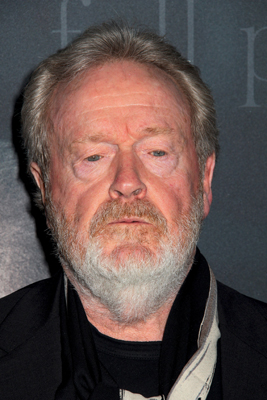
For all of the controversy that has surrounded All the Money in the World; first the news the film was going to replace actor Kevin Spacey after claims of sexual harassment against him came to light, to the equal pay between Mark Wahlberg and Michelle Williams. What many forgot was the enormous undertaking it was for Director Ridley Scott to not only do the re-shoot, but to convince veteran actor Christopher Plummer to step into the role with no time to research the character he was playing and to ignore all of the exterior things swirling around the project, and make a great film. We hear from both Ridley and Christopher on how this all came about and how the relationship between a director and actor can be so important. It is also important to note that since this original interview, Mark Wahlberg donated his $1.5 million dollar re-shoot salary to the Times Up Legal Defense Fund in Michelle Williams’ name. William Morris Talent Agency, who represents both Williams and Wahlberg also donated $500,000.
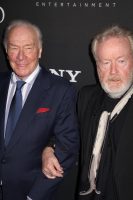 Q: What was the first phone call between Christopher and you? We met in a terrible room in the Four Seasons in New York. In like this awful conference room. Oh this is Four Seasons [laughs]. We met in (like) this room and I wanted to keep away from the bar because I wanted to have a vodka martini after I had flown in from London.
Q: What was the first phone call between Christopher and you? We met in a terrible room in the Four Seasons in New York. In like this awful conference room. Oh this is Four Seasons [laughs]. We met in (like) this room and I wanted to keep away from the bar because I wanted to have a vodka martini after I had flown in from London.
Christopher Plummer: He flew all the way from London to see me. Unbelievable. Even if I didn’t want to do it, I would’ve done it. [laughs] Just for that.
Ridley: Christopher said, well sounds good, let me read it first. And so he read it and the next day I think he said yes why not. You can do the usual blah, blah, what I said to Christopher, but he’s such a pro. He gets it and if I’m going to fly all the way to see Christopher, it’s going to be something serious. So, I think he took that on board and we never didn’t have a drink, did we?
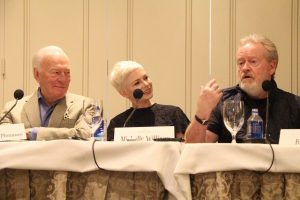 Christopher Plummer: No.
Christopher Plummer: No.
Q: By having this opportunity to go back and re-shoot and recreate some scenes, were there some major differences at all? Did you say, well I kind of would rather do it from this angle, so let’s try it from this side or add some new dialogue? Was there anything like that added?
 First of all, you got to protect Christopher from ever having seen what Kevin did because it has to be his. Christopher has to own it. Right? And, of course, I did ask, did you want to see it? He said absolutely not. So that was the right thing to do. Yeah? So off that I was born with a natural geometry in my head. It’s a gift for me, which was polished in years of commercials. So, I can literally shoot anything from any angle. Normally what lands perfect but actually correct, it’s right and I wouldn’t redo it. So, part of my problem in terms of its efficiency, I can turn a nine-day shooting to a twenty-two-day shoot if I’m being inefficient. But I figured all the scenes work geographically and choreographically so well. Why change that plan? But I never discussed that with Chris. I protected him from that, but I actually wanted to slide in what we already had to minimalize the extent of what we’d have to do if I start all over again. So, it was partly driven by practicality, but more mainly driven by the fact I liked the scenes.
First of all, you got to protect Christopher from ever having seen what Kevin did because it has to be his. Christopher has to own it. Right? And, of course, I did ask, did you want to see it? He said absolutely not. So that was the right thing to do. Yeah? So off that I was born with a natural geometry in my head. It’s a gift for me, which was polished in years of commercials. So, I can literally shoot anything from any angle. Normally what lands perfect but actually correct, it’s right and I wouldn’t redo it. So, part of my problem in terms of its efficiency, I can turn a nine-day shooting to a twenty-two-day shoot if I’m being inefficient. But I figured all the scenes work geographically and choreographically so well. Why change that plan? But I never discussed that with Chris. I protected him from that, but I actually wanted to slide in what we already had to minimalize the extent of what we’d have to do if I start all over again. So, it was partly driven by practicality, but more mainly driven by the fact I liked the scenes.
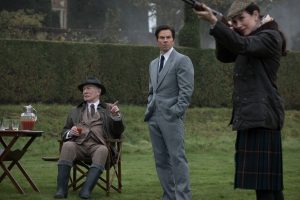 Q: What caused you to take the meeting and hear more about it since the initial setup of the movie didn’t interest you at first?
Q: What caused you to take the meeting and hear more about it since the initial setup of the movie didn’t interest you at first?
I was in the middle of something, which wasn’t quite landing. I was mid-stream on a fairly large project and I had a call from Bradley (Bradley Thomas, producer) and Dan Friedkin (producer) who said they’d like to meet because they’d like to work with me on something and said that the thing that was most current for them, thought I might be interested, was this script. I read everything myself, I don’t have anyone read for me. I read it, you can’t take a breath, you got to read it. The job is about reading and I read the script and it just sat there with me, hit me hard actually, and I knew I was mid-stream on the other one. So, I was able to utilize that and say, listen, we’ll put that on hold. We’ll evolve later and I want to jump in and do this. I was very unpopular with 20th Century Fox [laughs]. They were fucking warned.
 Q: You are very successful in an industry that we know a lot of money and from what we know about most of you, it seems you all balanced it with very healthy family lives. Did doing this movie give you any insight on what makes people like Jean Paul Getty have that disconnect where they value money over their loved ones?
Q: You are very successful in an industry that we know a lot of money and from what we know about most of you, it seems you all balanced it with very healthy family lives. Did doing this movie give you any insight on what makes people like Jean Paul Getty have that disconnect where they value money over their loved ones?
There’s a great scene with Getty (Jean Paul Getty), with the gun, the gun cleaning scene, which is where we get inside Getty’s soul and his disappointment and what he knows professes what money can do. We see it destroy men, it destroys families, but most of all it destroys the children. Cause you talk about the abyss of wealth, which in a similar way is the abyss of poverty. I would much rather die in the back of a Rolls Royce. Rather than in a garbage can somewhere. When you’re approaching that point, it’s all the same. Weather it’s the Rolls Royce or the garbage can, you’re into such disarray and distortion that either one is a tragedy.
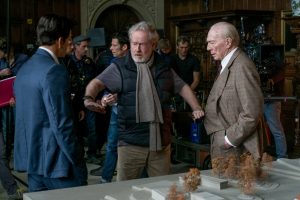 By the way, I used to work at ICI ammonia plant and laid runways, so we re-imported more Irishmen every year. I was a concreter, I did not come from a wealthy background. But I learned that way cause my dad made me work. Every Sunday. We worked Christmas. I had to have pocket money and he said it’s good for you. He was right. It was all I learned from it. There’s no way I would have ever ended up doing this job.
By the way, I used to work at ICI ammonia plant and laid runways, so we re-imported more Irishmen every year. I was a concreter, I did not come from a wealthy background. But I learned that way cause my dad made me work. Every Sunday. We worked Christmas. I had to have pocket money and he said it’s good for you. He was right. It was all I learned from it. There’s no way I would have ever ended up doing this job.
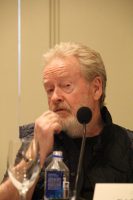 Q: Is it a hassle with the studio when you do a period piece in terms of budget?
Q: Is it a hassle with the studio when you do a period piece in terms of budget?
I did film American Gangster in Harlem, roughly the same period. And that was all done on a fairly restricted tight budget. This one, for the scale of the movie and the scale of the story was a slightly expensive movie for what it was. It’s not a low budget movie, but it ain’t anywhere near sixty or it’s below that. But I think off that I’m very respectful of Dan and what he wanted to do and Bradley, what they want to do with this. I want to keep it as tight as possible because I’m very economical. I always end up slightly below budget and it becomes an internal competition for me. Whether or not it has to do with how much money you’re gonna to spend on clothing or cars. I minimalized everything. Do I need a hundred cars? No. Do I need ten cars? Yes. Or five will do. Do I need to go crazy on wardrobe? No, I don’t. I’m very economical. But you’ve got to know where to put it to make it count.
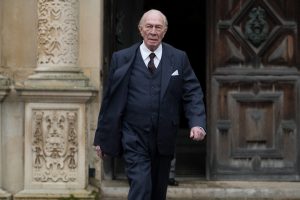 Q: Can you talk about working with Christopher, but also the other actors in terms of re-filming their scenes?
Q: Can you talk about working with Christopher, but also the other actors in terms of re-filming their scenes?
I learned way back when you learn your own roots, everyone learns their own roots, and I came into directing without going through drama school, or film school or anything. I was a very good designer. I was thrown in the deep end by asking to do live TV, an hour-long drama on live TV and the training was, there’s the script, there’s your office, and there’s your PA, you’re on in three weeks and so I had to go into, what in those days were, conventional ways of doing it. Which are church halls or women’s institutes with the sets laid out and tape on the ground with tapes and cups everywhere with PA’s running around with stop watches, saying cue darling, right? I got beaten up so often by actors who, the worst would be with just silence and rolling their eyes because I didn’t know what to say to them. After a while you start to design and devise your methodology. And what I discovered the best and most strategic and the most powerful thing to do is make a partnership with the actor you are working with. Because it is a partnership and frequently when I meet with an actor that I haven’t necessarily given the role to, I’ll chat with him about anything but the film. I’ll talk about bullshit with the family. What do you do? And suddenly they’re talking and they’re relaxing. And then usually they start to leak into the story, now you start to enter and from that moment on you have that best friend. And so my job is to be the actor’s best friend, cause my job is to make them feel absolutely secure on the floor in front of a piece of glass that I would never do what they do.
All the Money in the World is currently playing in theaters nationwide. For more info, visit the film’s official website at, https://www.allthemoney-movie.com/
Interview by Izumi Hasegawa – https://twitter.com/HNW_Izumi
Edited by: Jody Taylor – https://twitter.com/RealJodyTaylor
Follow Us: What’s Up Hollywood at https://twitter.com/WhatsUpHWood
